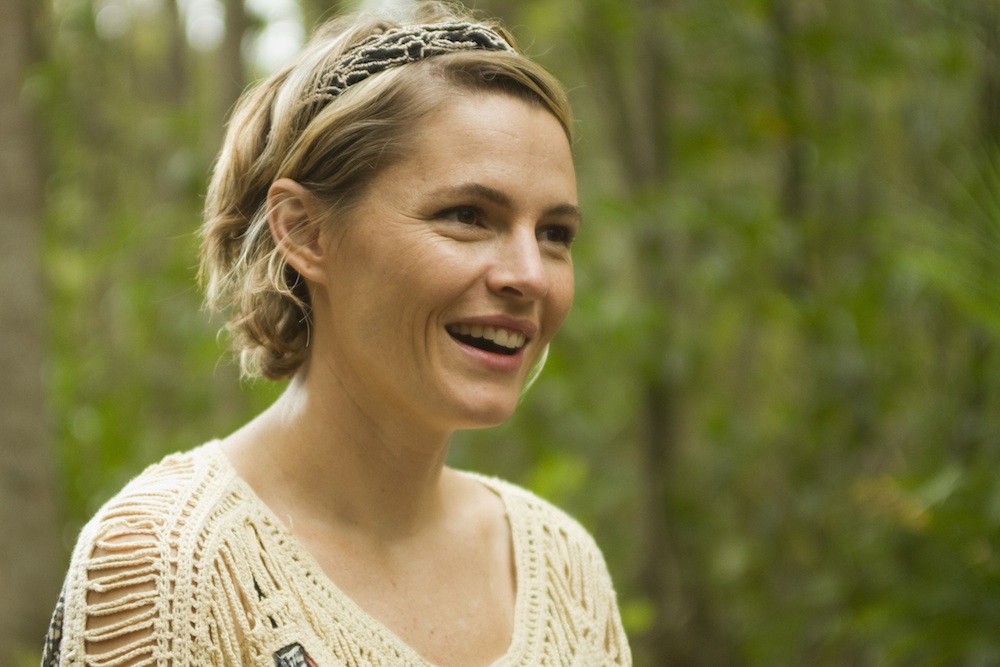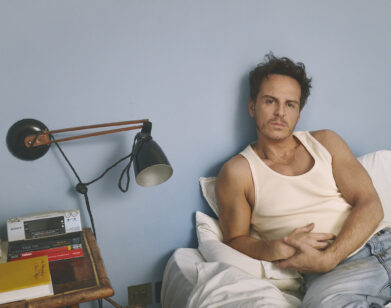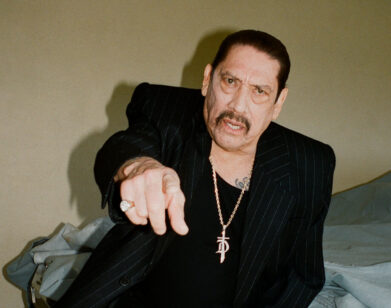Amy Seimetz’s Safe Haven

ABOVE: AMY SEIMETZ IN THE SACRAMENT
Amy Seimetz is fascinated by cults. It’s an interest that began long before she was cast in writer/director Ti West‘s latest spine-chilling film, the Jonestown-inspired The Sacrament. The actress would contemplate how vulnerability and the desperation to believe in something, whether religion or anything else, could bring people to commit horrific acts. “It’s terrifying and fascinating to me, because I think it happens in small scale all over the place,” she says.
Caroline, Seimetz’s character in The Sacrament, is a recovering drug addict belonging to an inclusive, self-sustained, sober-living community called Eden Parish. Its location is secret and remote, and its leader (Gene Jones), who goes by “Father,” is a Jim Jones-like figure with exaggerated Southern charm. After learning of Eden Parish’s relocation from the South to somewhere outside the U.S., Caroline’s photographer brother, Patrick (Kentucker Audley), brings his friends from VICE media—Sam (AJ Bowen), a correspondent, and Jake (Joe Swanberg), a cameraman—to investigate her welfare. When they reach the site, Caroline is suspiciously ebullient, masking some of the dark truths of what, on the surface, appears to be a utopia. The events depicted in the film transpire from the point of view of Jake’s and Patrick’s cameras.
The Sacrament arrives after a momentous 2013 for Seimetz. Last spring, her feature-length directorial debut, Sun Don’t Shine, was released to critical acclaim, followed by her equally praised co-lead performance in Shane Carruth‘s Upstream Color. The year also saw the prolific indie film actress transition into recurring roles on AMC’s The Killing and HBO’s Family Tree. In her personal life, Seimetz became engaged to Carruth. Seated near a bar inside the Magic Castle in Hollywood, she becomes girlishly flustered when trying to decide how best to explain her relationship with Carruth, before deciding that it’s OK to state that they’re engaged.
CHRIS TINKHAM: You and Ti West both had parts in Joe Swanberg’s Silver Bullets some years ago. Had you known him before that?
AMY SEIMETZ: I met him the first day I met Joe. Joe was interested in casting me in something. Everyone was in town for the Spirit Awards either in early 2007 or 2008. I actually don’t remember now. A bunch of filmmakers met up, and Joe had seen me in something else. Then I ended up doing [Swanberg’s] Alexander the Last, and Ti was good friends with Joe. We ended up doing Silver Bullets shortly after Alexander the Last.
TINKHAM: For your role in The Sacrament, did you do any research on cults or come across any disturbing accounts?
SEIMETZ: The most interesting stuff that I heard about Jonestown was about people who slowly gave their trust to [Jim Jones]. He wasn’t just a charismatic man that they went and followed. He would spend time with them, take in the poor and feed people, gave them family. He was a big civil rights activist, helping families that were being terrorized. He created an environment that felt safe, where the rest of the world didn’t feel safe. I think that’s really interesting. These people weren’t idiots. The rest of the world was terrifying to them, and this place felt safe. I think, for Caroline, that’s what was happening, coming out of a drug addiction. The world feels terrifying and new when you’re coming out of either trauma or addiction, and you don’t know how to cope with it. So, suddenly, here’s a place that makes me feel safe. And I can go to it, and I can tell people what I’m feeling, and they don’t make me feel bad about it, feel that I should continually blame myself, which my family’s doing because they tell me I’m a fuck-up, or something like that. So, she found her answer, and that’s what I hold onto. It’s an environment where, first, it felt safer than the real world. Then it got isolated and horrific.
TINKHAM: When doing press for your film, Sun Don’t Shine, you said that it was partly inspired by the morbid stories that seem to perpetually come out of your home state of Florida. Have you seen the game show bit on Seth Meyers’ show, Fake or Florida?
SEIMETZ: Yeah. [laughs] There’s another one, [Loveline‘s] Germany or Florida?
TINKHAM: Where is home for you now?
SEIMETZ: I sublet place to place with my fiancé. We don’t really have a home. [laughs] I haven’t had a proper home for years.
TINKHAM: You just reside wherever you’re working at that moment?
SEIMETZ: If I’m not working, then wherever is convenient, or wherever we want to be. Yeah, it’s a very vagabond experience. I really haven’t had my own home for three or four years now. It just doesn’t make any sense for me. And I’ve never really dreamed of owning a home. I don’t think you go into the arts and also dream of owning a home. [laughs]
TINKHAM: What can you tell me about your comedy duo Machu Picchu?
SEIMETZ: [laughs] I was in a comedy duo. We did characters. It was my friend Ann Maddox and I. She still does Upright Citizens Brigade Theatre performances. She’s very good. I was doing experimental theater and experimental film in San Francisco, and I moved to Los Angeles, and what I got frustrated with was, it seemed like everyone was waiting for something to happen. Obviously, films take a lot of planning, and I wanted something more immediate, and comedy started to become that. Our performance was strange—really, really weird. Some people didn’t even know if it was comedy. It was totally absurd, almost like a Japanese game show, where you’re bombarded and thinking, “I don’t know what’s going on.” I’ve seen comedians make people laugh by being either really dark and sad and touching, or really strange and bizarre and creepy. You can take the format and do whatever you want with it, and that seemed interesting to me at the time. We did it for a period of a couple years, and we performed for shows like Comedy Death-Ray. They do a podcast now, Comedy Bang! Bang! It was Scott Aukerman and BJ Porter, who also do Between Two Ferns. They did this show that used to be at the M Bar. We used to play there. Louis C.K. and Zach Galifianakis would perform there. We would perform at a bunch of places. It was something really genuine that we thought was funny. We just wanted to perform, and I think people responded to that. The whole reason I had been to the Magic Castle before was because comedians and magicians sort of overlap in the variety show circuit, so we knew magicians that would perform here all the time.
TINKHAM: And you did some work on Tom Waits’ Glitter and Doom tour. How did that come about?
SEIMETZ: I did stage design stuff and helped them with designing some of their merch for that tour. Overall, just sort of art direction. I’d worked for them before as an assistant when I lived in San Francisco, and then continued to do work for them after I had moved away, ’cause they’re a very close-knit family.
TINKHAM: Shane Carruth has said that he wasn’t aware of your work prior to considering you for the part of Kris in Upstream Color. Did you eventually meet before he cast you?
SEIMETZ: We had a bunch of phone conversations. I was in the middle of editing my movie, and he asked to watch it. So I sent him a cut. Based off that, he cast me. To this day, I think he’s seen me act in only one other thing. [laughs]
TINKHAM: Which one?
SEIMETZ: The Killing. [laughs]
TINKHAM: For an actor, there must be some anxiety about where your next job is coming from, but, as in the case of Upstream Color, the blind turns where certain jobs can take you have to be exciting.
SEIMETZ: It’s always exciting. I never knew where I was going to end up when I started film. I didn’t start film to be famous. Of course, it’s a public medium, and of course we chose a public medium because we like people to pay attention to the work that we’re doing. But I didn’t know what I was going to end up. I came at it from an idea of wanting to make good films. I still have no perspective on exactly where I am. [laughs] I wasn’t like, “Oh, next stop, network television!” Whatever those goals are, I didn’t have them. I love James Benning’s work, and when I met him, I thought, “Great! That’s all I need.” And then I’d meet a new filmmaker that I’d always loved, and I’d think, “Great! I’m in the right place.” It’s a weird way to look at it, but I don’t care as long as I’m able to make stuff that I want to make.
TINKHAM: For all intents and purposes, Sun Don’t Shine is your feature-length directorial debut, but you made a more experimental feature years ago, right?
SEIMETZ: Yeah.
TINKHAM: What’s the name of that?
SEIMETZ: City on a Hill. Yeah, Sun Don’t Shine‘s the most narrative feature that I’ve done to date.
TINKHAM: Did City on a Hill ever screen at festivals or for the public?
SEIMETZ: I did small screenings and museum stuff.
TINKHAM: Do you have any plans for it now?
SEIMETZ: No. At some point, maybe I’ll release it. I shot it on materials that I’d have to go back and update, and digging that out takes some time. [laughs]
TINKHAM: It was fun to see you on Law & Order: Special Victims Unit last winter. You also had recurring parts on The Killing and Family Tree last year, but I was wondering how your experience with network TV compared, with regard to the exposure you got.
SEIMETZ: More people saw me on SVU than anything I’ve done in my life. [laughs] There were people that I was getting emails from that I hadn’t heard from for God knows how long. I don’t even know how they got my email address. They were saying things like, “I didn’t even know that you worked in film! That’s great!” And I was like, “It’s been a decade, guys. I have a whole body of work.” Suddenly, I do one episode of SVU and they’re saying, “Congratulations! You’ve made it!” [laughs] I was on an entire season of a really great television show, but when I’m on one thing playing a crazy killer, they’re like, “She made it!” When I was telling people that I was going to be on SVU, a well-regarded director told me, “Wait, you haven’t done it yet? That’s like a rite of passage. Everyone does it.” [laughs] It was weird. I was thinking, “Is it a good thing to be doing this?” And then the next week, Alec Baldwin was on, and I thought, “OK, wait, this is great.” [laughs]
TINKHAM: What are you working on now?
SEIMETZ: I wish I could tell people what I’m directing next, but I can’t.
TINKHAM: What stage are you at with it?
SEIMETZ: Writing, but it’s a definite. And then I’m producing for, his Barry Jenkins next movie. And then I’m also producing for Shane’s next movie too.
THE SACRAMENT OPENS IN SELECT THEATERS ON JUNE 6.






